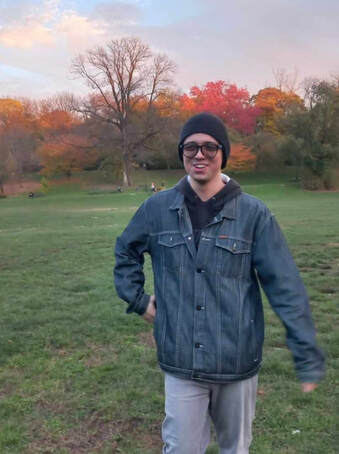Haibun with Benadryl, Snow, and Mother Wound
by Narisma
I was fourteen years old when I watched a stranger fondle my mother’s naked breast. I could see them through her bedroom window: two stumps of withered wood, their gnarly branches barely touching. The silver sun blistered out of that wet darkness, illuminating bottles of putrid Red Horse and Emperador Light. I stood transfixed as his cigarette-stained fingers pried back my mother’s crimson bra, exposing her darkened nipple. Her drunken breath formed in the sticky air, her consciousness a mere ripple of water. Even the empty swimming pool at their feet seemed to swell with life, as though the sea between us could carry me home. I remember pressing my cheek against the glass and praying to God: I will do anything if you make it stop.
*
When my mother failed to find salvation in the back of the local bar, she came home one day and threatened to kill our grandma. She seized an old electric fan and hurled it across the room. As my sister folded between my arms, we watched it arc gracefully through the air: a blur of metal and dust, the most perfect blood orange star.
*
At my first ACA meeting, I do not say a word. It has been two years since I moved to New York. The neighbor’s trees are skinny again, it is September once more. I only manage to find the support group after slipping through the back entrance of the church. The floorboards creak beneath me: rotting band-aids on the house of God. We sit in a broken circle on the second floor, giving me the bizarre impression of musical chairs. To my left is a massive grizzly bear of a man, to my right is a wispy woman who looks so fragile, I’m afraid she might break. Sheets of emerald paper lie sprawled around us: God, grant me the serenity to accept the people I cannot change, the courage to change the one I can, and the wisdom to know that one is me. The stillness is aggravating. Even my mother’s funeral was more lively than this. I remember the great procession from her wake, how the streets drained themselves in our sudden exodus, bundles of kamuning gulping in the aftermath. I am restored to the present by the speaker’s voice. I wish I never told them my name. I avoid looking at the others’ faces for too long, or else their features start to blur. That night, I return to my apartment and slam cheap vodka with my friends.
*
From my mother’s bedroom window, I watch two cats fuck on the street.
*
The trauma therapist’s office is unbearably juvenile. Ugly crayon drawings line the plaster walls. “Why do you write?” he asks me, as if I’d ever know. I used to think my craft was a torch: blazing through the darkness, my grief the shrunken wick. Now, I think my craft is a shadow — forever affixed to my loss, bruised like my uncle’s silhouette against the TV, his drunken scream piercing my body like war. Perhaps my craft is the moon, her blue body the only thing beside me the night I tried to die. My craft is a box of ravaged Benadryl. My craft is cancer inside the throat. My craft is my mother’s sudden aneurysm. My craft is that dingy hospital lobby. My craft is I never, ever escaped.
*
I have a dream: my sister and I are lying on the basement floor, and I burn my hair to keep her warm.
*
If I am a boat mother, you are the reflection of the moon on the river — Kimberly Nguyen
*
The sky is so blue, I could cry. Svea drives me around Minneapolis and points out every lake upon which white men have laid waste. Manila Bay is like this too: the city looming before us, a tangle of driftwood and gasoline. In a past life, I was a bride-to-be, and my lover and I washed upon shore on the back of a crib. I recall the way he kissed my neck, how he held me like a wine bottle, how we watched egrets feast upon corpses between the mangroves. In Svea’s house, I lie flat on the floor and wait for her parents to scream. It never comes. Instead, I watch her father play guitar on the couch while her mother combs their springerdoodle’s hair. Somehow, this is worse. Two winters later, I return in the middle of a storm and let the breath of God consume me. Her mother makes me soup. For the first time in months, I allow myself to be loved.
*
My sixth ACA meeting occurs shortly before Christmas. A fake spruce tree rises behind us, fairy lights sparkling like plastic fireflies. The speaker says we deserve to detach ourselves from that which continues to wound us. If you must know anything, then first remember this: the lonely son will always miss his mother. Even if he’s running from someone already dead. Because grief was once a cage, an obstruction, a well. Now grief is like air — I can never evade it. But perhaps one day, grief can be light: unyieldingly brief yet perpetually here. Needling through dampness and fluorescing into teeth. The five petals of a stained glass window, high above the speaker’s head, unfurling into redness of the most devastating kind.
*
Mother, look! Your voice
Transforms into a bloody
Blossom of fresh snow.
Transforms into a bloody
Blossom of fresh snow.
|
Narisma is a writer and artist from the Philippines. His work has appeared or is forthcoming from Lammergeier, Honey Literary, The Margins, and The Spotlong Review, among others. He currently lives on Lenape land in Brooklyn, New York, where he dabbles in radio production and filmmaking. Find him online at @_narisma_
|



